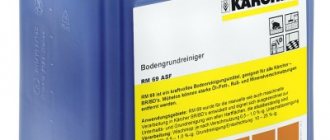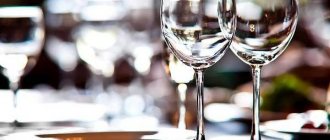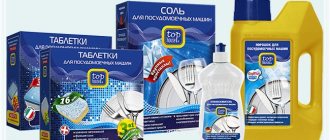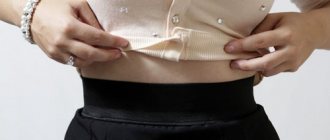12/05/2014 Category: Cleanliness Author: Natalya Ivantsova
Strong odors from household chemicals, irritation and dryness of the skin after washing dishes with one of the popular products - all this inevitably leads to the idea that one’s own home has become an unsafe place due to the abundance of all kinds of chemicals in it. Willy-nilly, you will remember that there are a lot of folk remedies that you can now buy for pennies, use them to clean everything in your apartment until it shines, without suffering from the consequences of interaction with industrial chemicals.
- Soda for washing dishes and cleaning the house
- Vinegar for house cleaning
- Hydrogen peroxide for bleaching fabrics
- Lemon for cleaning an apartment
- Other folk remedies for cleaning the house
- Cleaning without chemicals: the experience of a mother of two children (video)
Mustard for washing dishes
Few people know, but mustard copes well with greasy dishes, easily and completely cleaning them, without leaving grease on the hands and without harming the skin of the hostess’s hands.
To make it convenient to wash dishes with mustard powder, you need to pour a small amount of it, for example, onto a tin or plastic jar lid, and then dip a damp sponge into it. A little powder will remain on the sponge, which can be used to wash everything from greasy pans and plates to tea and children's dishes.
Mustard powder is easily washed off from the surface of dishes and is absolutely harmless not only to humans, but also to the environment.
If hard lumps have formed in a container with mustard powder, you need to pour a little water into it, and the resulting mixture, which has a consistency similar to sour cream, also successfully continues to wash the dishes.
Soda for washing dishes and cleaning the house
Baking soda or sodium bicarbonate is produced industrially by two chemical reactions between a concentrated solution of sodium chloride and carbon dioxide. Despite its chemical origin, soda is absolutely fire- and explosion-proof and non-toxic.
Baking soda is another cheap remedy that should definitely be on hand in every kitchen.
If mustard copes well with greasy pans, then soda easily cleans everything you need literally until it shines and squeaks: from teapots and pots to silverware, from long-unwashed ovens and barbecues to an old refrigerator and tiles.
It is also enough to take a little of it on a damp sponge, only this time on its rough side, and lightly rub the stain on the stove or frying pan. You'll see, the effect will be amazing.
Baking soda also easily neutralizes unpleasant odors:
- from smoky furniture , which you just need to sprinkle with baking soda and vacuum it after a few hours (you can also clean the carpet from unpleasant odors);
- from odors in the toilet , in which you only need to leave a small open container with one hundred grams of soda;
- from musty odors of old things - they also need to be lightly sprinkled with soda and vacuumed after a while;
- from stale dishwashing sponges or towels , which need to be soaked in a solution consisting of a drop of detergent, two tablespoons of soda and warm water.
Vinegar for house cleaning
Vinegar is traditionally produced through biological synthesis from acetic acid bacteria, which in turn are obtained from alcohol-containing raw materials. Vinegar has been known since ancient times: the first mention of it is found in sources about ancient Babylon, where acetic acid was obtained from dates.
Vinegar (6% or 9%) diluted with water is also a fairly universal remedy that will help keep your home clean and fresh.
If you mix vinegar and water in a one-to-one ratio and add a little lavender oil for scent, then you can use this solution to wipe floors and window sills, and remove stains in the bathroom or kitchen.
to lime stains on your plumbing by first pouring vinegar on them, then sprinkling a little baking soda on them and letting them sit for a while. Afterwards they can be easily removed with a sponge or brush.
With a solution of 9% vinegar and water in a ratio of one to five, you can easily wash the dirtiest windows by simply applying the resulting product to the glass and then wiping it with paper (for example, newspaper) or a clean rag.
Hydrogen peroxide for bleaching fabrics
Hydrogen peroxide can only be explosive in concentrated form. But thanks to its excellent solubility in water, ether and alcohol, it has been successfully used for a long time, including in the household, and does not pose any threat.
Many people notice how white things turn gray or yellow over time, either from washing in a washing machine, or from modern powders and bleaches. One way or another, at some point it becomes clear that the white blouse has ceased to be so.
This pressing problem can be easily solved by keeping the laundry in a solution of hydrogen peroxide for about 15 minutes (add one teaspoon of 3% peroxide to two liters of water). By stirring whites and clothes every 5 minutes, it is very easy to achieve uniform whitening without much effort and expense.
If there is no hydrogen peroxide in the house, then a solution of potassium permanganate or ammonia can come to the rescue. A small amount of potassium permanganate (literally half a teaspoon) should be diluted with washing powder (about 200 grams) in hot water, put the grayed clean laundry in there and leave to cool. After the rinsed items dry, their color will change noticeably.
If linen or cotton clothes have lost their former whiteness, then you should keep them for two to three hours in a solution of ammonia (6 tablespoons per 10 liters of water).
Cleaning the bathroom without chemicals
In the bathroom, the most problematic place is the walls (if they are tiled). In order to put it in order, you need to prepare a mixture of 50 grams of baking soda, 2 tablespoons of hydrogen peroxide and 1 teaspoon of any liquid soap.
Mix everything and apply it to the seams between the tiles, as well as directly to it. Wash off after 15 minutes with warm water. You can use this product to clean the bathroom without any restrictions - even every cleaning. It will not harm the appearance of the tiled walls, bringing them into perfect shape.
Lemon for cleaning an apartment
Lemon is distinguished by the fact that, along with the strong cleansing properties of its sour juice, it also has a pleasant natural smell. It is not for nothing that household chemicals produced industrially are often scented with the smell of lemon.
Thanks to its unique properties, lemon can help in several cases:
- For cleaning the microwave oven.
Huge difficulties always arise when trying to tidy up the inside of a microwave. A simple recipe for a solution of lemon juice and water in proportions of 3 tablespoons per 400 ml can come to the rescue. If you heat an open container with this solution in a microwave oven at the highest power for 10 minutes, then at the end all that remains is to wipe the inside of the oven with a cloth to completely clean it.
- Lemon as a natural air freshener.
By cutting a lemon in half and leaving it close to, for example, the cat's litter box, you can henceforth forget about the source of the unpleasant odor.
- of removing limescale deposits on the tap .
Simply wipe the mixer with lemon and then secure the result with a dry cloth or sponge.
Cleaning without detergents - pros
The use of aggressive household chemicals is gradually being abandoned in many civilized countries: Germany, Switzerland, Norway, Japan and others. Conventional powders, gels and solutions are being replaced by “eco” ones. And in families with low incomes they use simple products:
- salt,
- soda,
- vinegar,
- citric acid,
- hydrogen peroxide,
- mustard.
Argument 1. Security
Cleaning without chemicals does not cause discomfort to people with allergies, asthma, or heart pathologies. And in general, it helps maintain health in the long term.
Typically, household chemicals contain the following harmful compounds:
- Phosphates
Found in most washing powders in Russia. They cause skin irritation, can accumulate in the body and provoke the development of tumors. Also, phosphates from drainage enter the soil and harm the environment. They significantly worsen the quality of drinking water in cities.
- Surfactant
They are part of almost all washing liquids, even soap. They disrupt the protective hydrolipid layer of the skin, and when accumulated in the body, they provoke endocrine disorders.
- Chlorine
Present in some bleach and disinfectant solutions. Dangerous for the respiratory and cardiovascular systems.
We recommend: How to restore a cast iron frying pan if it rusts?
Detergents may also contain other harmful compounds: formaldehyde, phenols, cresols, 2-Butoexitanol, ammonia, synthetic dyes and fragrances. Therefore, many people refuse household chemicals for cleaning their homes.
Argument 2. Saving money
Household chemicals “eat up” a significant part of the family budget. Highly specialized products are especially expensive:
- for cleaning carpets;
- for car interior;
- for washing plumbing fixtures;
- for whitening.
“Grandma’s” recipes, on the contrary, help save money. Most cleaning products can be found in every home.
Argument 3. No pungent odors
Most store-bought cleaners smell strong and “chemical.” It is especially difficult for sensitive people, children, and allergy sufferers.
Cleaning without detergents does not cause such discomfort - it only leaves a feeling of freshness.
Other folk remedies for cleaning the house
There are other folk recipes for using natural and affordable products for effective house cleaning:
- Salt copes well with blockages in pipes: to do this, you need to pour it into the pipe and pour hot boiling water on top.
- A mixture of ammonia and soap perfectly polishes glass.
- And the mirror will sparkle clean if you wipe its surface with a mixture of vinegar and water in proportions of one to one.
- Strong tea will also help with stains on the mirror . After wiping the mirrors with a sponge soaked in strong tea, you need to polish them later with a dry cloth.
- The crystal will shine again if you soak it in a solution of tea and vinegar in proportions of two to one.
Composition of ready-made detergents for washing and cleaning
The composition of washing and cleaning products can be natural, that is, without chemicals, or artificial. The concentration of artificial components may vary depending on the type of product.
Synthetic detergents for washing and cleaning
The high concentration of surfactants, phosphates, chlorine, fragrances, and phthalates in laundry and cleaning products raises fair concerns.
Particles of harmful substances enter the air when the package is opened, come into contact with the skin, and enter the respiratory tract.
The spread of many dangerous diseases is associated with exposure to harmful chemical components of washing and cleaning products.
Laundry and cleaning products with a high content of surfactants, chlorine and phosphates are characterized by good foaming and the ability to efficiently wash and clean dirt. Therefore, manufacturers are in no hurry to reduce the amount of harmful chemicals in household cleaning and laundry products.











